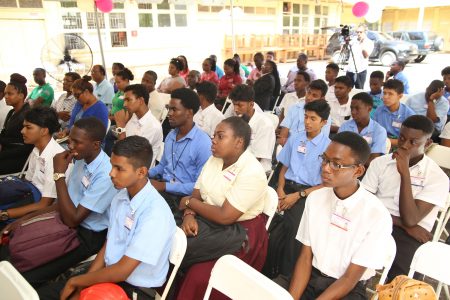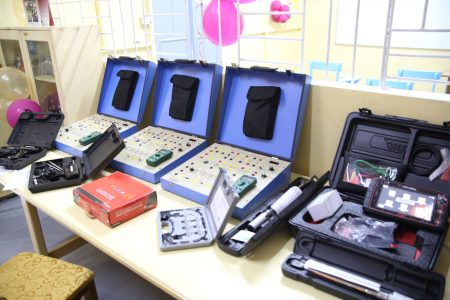With the aid of three Canadian colleges, the Government Technical Institute (GTI) has added an Automotive Electrical/ Electronic Service and Repairs programme to its curriculum.
The programme’s introduction comes four years after its conceptualisation. It was born from feedback from employers that GTI graduates were deficient in the area of automotive electrical/electronic service and repairs. As a result, the new programme will allow graduates to better meet the demands of the job market.
Speaking at the launch last Friday at GTI, Director of the Council for Technical and Vocational Education and Training (CTVET) Sydney Walters argued that as the number of vehicles on Guyana’s roadways increase annually, a distinct occupational programme for automotive electrical/electronic service was needed.
The programme was developed through collaboration between CTVET, and Durham College, College of North Atlantic, and The Marine Institute, of Canada.


According to Renita Crandon-Duncan, Principal (ag) of GTI, a proposal was submitted in 2013 to the Canadian universities following the recognition of the importance of the programme for the institution and Guyana at large. In 2014, she said, project plans were completed and approved.
Additionally, Durham facilitated the drafting of GTI’s five-year strategic plan in July, 2017, and GTI staff members were exposed to three levels of technical training to allow for the best delivery of the programme.
“Our sister institutions were also a participant of [the] technical training; we even collaborated with our secondary partner, Excelsior College, and they too shared their expertise,” Crandon-Duncan said. “Approval for the programme to be offered at GTI was given in May 2017 and commenced with 12 participants,” she added.
he said too that efforts to ensure that the trainers would be exposed to a conducive learning environment saw the institution transforming its auto shop into a space that would better facilitate the delivery of the programme.
Furthermore, critical to the success of the programme was the involvement of the industry in assisting with guest lecturers along with vehicles on which to practice.
As a result, Crandon-Duncan acknowledged MACORP as being one such company that has partnered with the GTI before extending gratitude to them for their contributions.
Katie Boone, Manager of International Projects and Partnerships at Durham College, in her remarks, said the growth of GTI over the last three years has been “extremely impressive.” “However, it is the growth in leadership, the development of visionary thinkers, and the renewed sense of teamwork on campus that will have the most long-term impact,” she added, while noting that the “concrete and measurable achievements” throughout the life of the project can be leveraged and sustained to continue to improve the quality and success of GTI graduates entering into the workforce “and thus highlighting the role training institutions have in closing the gap of unemployment and finding a desirable career opportunities for Guyanese youth.”
Meanwhile, Crandon-Duncan also described the launch as a dual celebration, since not only was there the launching of the Automotive Electrical/ Electronic Service and Repairs programme but also the closing ceremony of the Caribbean Education for Employment (CEFE) programme.
CEFE, a seven-year project, was said to have been designed to strengthen technical and vocational education and training in Caricom by supporting institutions, including national training agencies, as they move to a more responsive, applied, and demand-driven system that seeks to meet the needs of the labour market.





